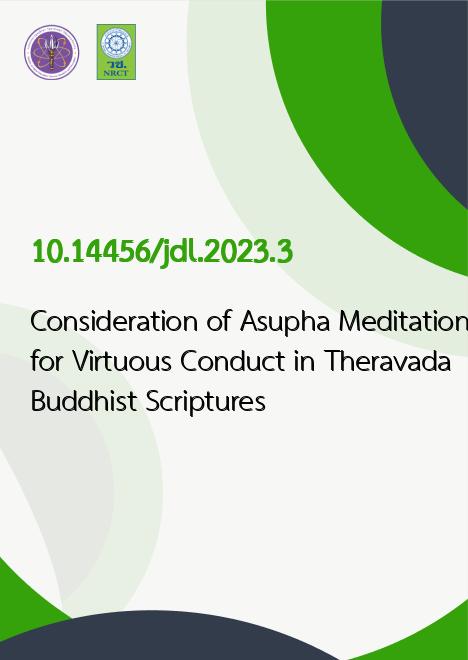
|
Consideration of Asupha Meditation for Virtuous Conduct in Theravada Buddhist Scriptures |
|---|---|
| รหัสดีโอไอ | |
| Creator | Phra Somkit Chittaro |
| Title | Consideration of Asupha Meditation for Virtuous Conduct in Theravada Buddhist Scriptures |
| Publisher | Journal of Dhamma for Life |
| Publication Year | 2566 |
| Journal Title | Journal of Dhamma for Life |
| Journal Vol. | 29 |
| Journal No. | 1 |
| Page no. | 26-36 |
| Keyword | Asupha Meditation, Virtuous Conduct, Theravada Buddhist Scriptures |
| URL Website | https://so08.tci-thaijo.org/index.php/dhammalife/index |
| Website title | Journal of Dhamma for Life |
| ISSN | 2820-048X |
| Abstract | Morality is related to meditation practice. The word "conscience" means behavior that is heavier to one side and is normal in nature in character. Behavior that is heavy in any way according to the person's normal mental state. Indecisiveness involves behaving heavily towards love and beauty and having both physical and physical responses. Words and hearts related to love, beauty, and love Sensual is normal behavior. Behaving hard toward love, beauty, love, and beauty the opposing meditations for solving are Asupha and Kayagat?sati. This change of ethics as well as the principles of Vipassana practice considers Asupha meditation to improve, improve, and change behavior. ethical education in practice meditation is to bring the principles of Dharma practice to the development of human wisdom in the right direction with the relationship of morality in the practice of dharma can be used as a guideline for the development of individual intelligence resulting from Practicing Dharma to increase potential which is beneficial for those who practice Dharma It is the development of one's own mind appropriately and is a guideline for further Dharma practice. |